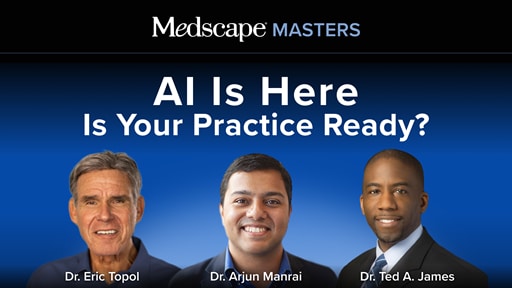Event Transcript
Click here to access the full transcript (pdf)
Summary and Key Highlights
By Kara Grant
In the second installation of the Medscape Masters series, Aaron Goodman, MD, a hematologist at UC San Diego, and Mark Lewis, MD, director of gastrointestinal oncology at Intermountain Healthcare in Utah, came together to debate the topic of patients’ immediate access to cancer test results. Moderated by WebMD’s chief medical officer John Whyte, MD, who practices as an internist himself, Goodman argued in favor of patients getting access to their electronic health records (EHRs) without delay, a key feature of the 21st Century Cures Act that went into full effect in October 2022. Lewis took the opposing position, arguing that even though there’s no changing the Cures Act, patients' unprecedented access to their results has been burdensome for both patients and the healthcare system alike.
The argument in favor of immediate patient access to test results:
According to Goodman, his position is obvious: Patients deserve to see their EHRs without delay. It’s their health information, and they should be able to control when and where they see it. Patients also don’t have to look at it, Goodman emphasizes.
The argument against:
Lewis knows that his stance against Open Notes and immediate EHR access isn’t a popular one, especially among patients. He also knows that despite his opposition to it, the 21st Century Cures Act isn’t going away anytime soon. But Lewis holds that giving all of this information to patients — or what he calls “à la carte oncology” — puts the onus of understanding their labs and test results unfairly on patients before they have the chance to see a doctor.
Should AI play a role?
Both Goodman and Lewis agree that the movement to write plain-language summaries of medical reports and enhancing patients’ health literacy is a good thing. And now, with OpenAI and ChatGPT, artificial intelligence is able to synthesize complex medical information, translate that into legible language, and deliver it in a compassionate manner. This would still require physician oversight to make sure the information is correct, said Goodman and Lewis.
The ways AI will change healthcare going forward is the topic of the next Medscape Masters event on Wednesday, November 8. Medscape’s editor-in-chief, Eric Topol, MD, will be joined by Arjun Manrai, PhD, deputy editor at NEJM AI, and Ted James, MD, medical director and vice chair at Beth Israel Deaconess Medical Center in Boston. You can register for that event here.
Our Editors Also Recommend:
Medscape Oncologist Lifestyle, Happiness & Burnout Report 2023: Contentment Amid Stress
This Is How You Get Patients Back for Follow-Up Cancer Testing
Navigating OpenNotes: Advice From an Oncologist Who Survived Cancer
Also from Medscape Masters:

Follow Medscape on Facebook, X (formerly known as Twitter), Instagram, and YouTube
Medscape Oncology © 2023
Cite this: Should Patients Have Immediate Access to Cancer Test Results? - Medscape - Oct 20, 2023.






Comments